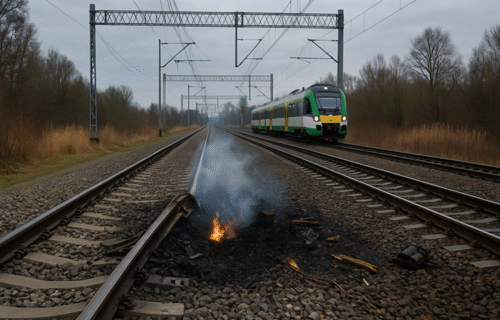Over the weekend, Polish authorities confirmed an act of sabotage on the Warsaw–Lublin railway line, a key route for civilian and military traffic towards Ukraine. An explosive device detonated near the village of Mika on line no. 7, damaging a section of track. Prime Minister Donald Tusk described the incident as an “unprecedented act of sabotage” and warned that it could have led to a serious rail disaster.
Local residents reported hearing a loud explosion, and a train driver later noticed a section of track damaged over roughly one metre, prompting an emergency brake application and closure of the line. In a separate incident on the same route, damage to overhead power lines and objects placed on the track forced a Świnoujście–Rzeszów train carrying 475 passengers to stop; no one was injured.
Line no. 7, which links Warsaw with Lublin and onward to the Ukrainian border, has become a strategic transport corridor in recent years, including for military aid and logistics to Ukraine. Polish prosecutors are investigating the damage as sabotage and potential terrorism. Senior officials, including the security services minister, have indicated a strong likelihood that those responsible acted on behalf of a foreign intelligence service, though the investigation is ongoing.
The incidents highlight how attacks on critical infrastructure can be used in hybrid operations to disrupt logistics and undermine public confidence in the state’s ability to provide security. Even without causing mass casualties, such acts can erode trust if they create a perception that key transport routes and supply lines are vulnerable.
In response, officials have announced stepped-up inspections of vital railway lines and greater involvement of the military in securing infrastructure. Experts argue that beyond public statements, Poland will need stronger monitoring of linear infrastructure, improved technical detection systems, and closer cooperation with local communities, who are often the first to notice unusual activity near tracks.
Ultimately, the resilience of infrastructure depends not only on technology and services, but also on informed, engaged citizens and a state capable of reacting quickly and decisively to emerging threats.
Source: WEI
